Introduction
In a world where the hustle and bustle of daily life often overshadows the importance of personal well-being, the conversation around healthy eating versus dieting has never been more critical. As organizations grapple with rising health concerns among employees, understanding the distinctions between sustainable eating habits and fleeting diet trends can empower HR Benefits Managers to foster a culture of health within their teams.
The shift towards nourishing the body with whole, nutrient-rich foods not only enhances individual wellness but also drives productivity and engagement in the workplace. With alarming statistics predicting a rise in obesity rates, the time for action is now. By embracing mindful eating practices and prioritizing nutrition, organizations can create an environment that supports both physical and mental health, ultimately leading to a more resilient workforce.
This article delves into the transformative power of healthy eating, the risks of fad diets, and the pivotal role of nutrition in enhancing workplace performance, offering valuable insights for those ready to champion well-being in their organizations.
Understanding the Core Differences: Healthy Eating vs. Dieting
Healthy consumption is a powerful approach that focuses on nourishing the body with a wide array of foods rich in essential nutrients, ultimately supporting overall health and well-being. It involves a balanced intake of:
- Fruits
- Vegetables
- Whole grains
- Lean proteins
- Healthy fats
These elements together create a foundation for a vibrant lifestyle. In stark contrast, dieting often embodies temporary and restrictive eating patterns, which help to describe the difference between a healthy diet and dieting to lose weight.
Such diets can unintentionally result in nutrient deficiencies and foster an unhealthy relationship with food. As James Cascone, Partner at Deloitte, aptly stated during a critical news conference,
Averting a crisis means recognizing the vital role of food accessibility in public health.
This is especially pertinent as specialists forecast that by 2030, almost half of all U.S. adults will be obese, emphasizing the urgent need for sustainable dietary habits.
Furthermore, the case study titled 'Impact of Economic Recovery on Diet Affordability' illustrates how economic factors can influence access to healthy diets. Although some regions have experienced improvements, the recovery remains uneven, particularly in low-income areas, exacerbating the challenges of maintaining a healthy diet. By embracing the philosophy of healthy consumption and making informed, sustainable choices, individuals can cultivate a lifestyle that enhances both physical and mental wellness.
This is not merely a personal journey; it represents a collective call to action for organizations to support their teams in adopting healthier food habits that lead to lasting benefits.
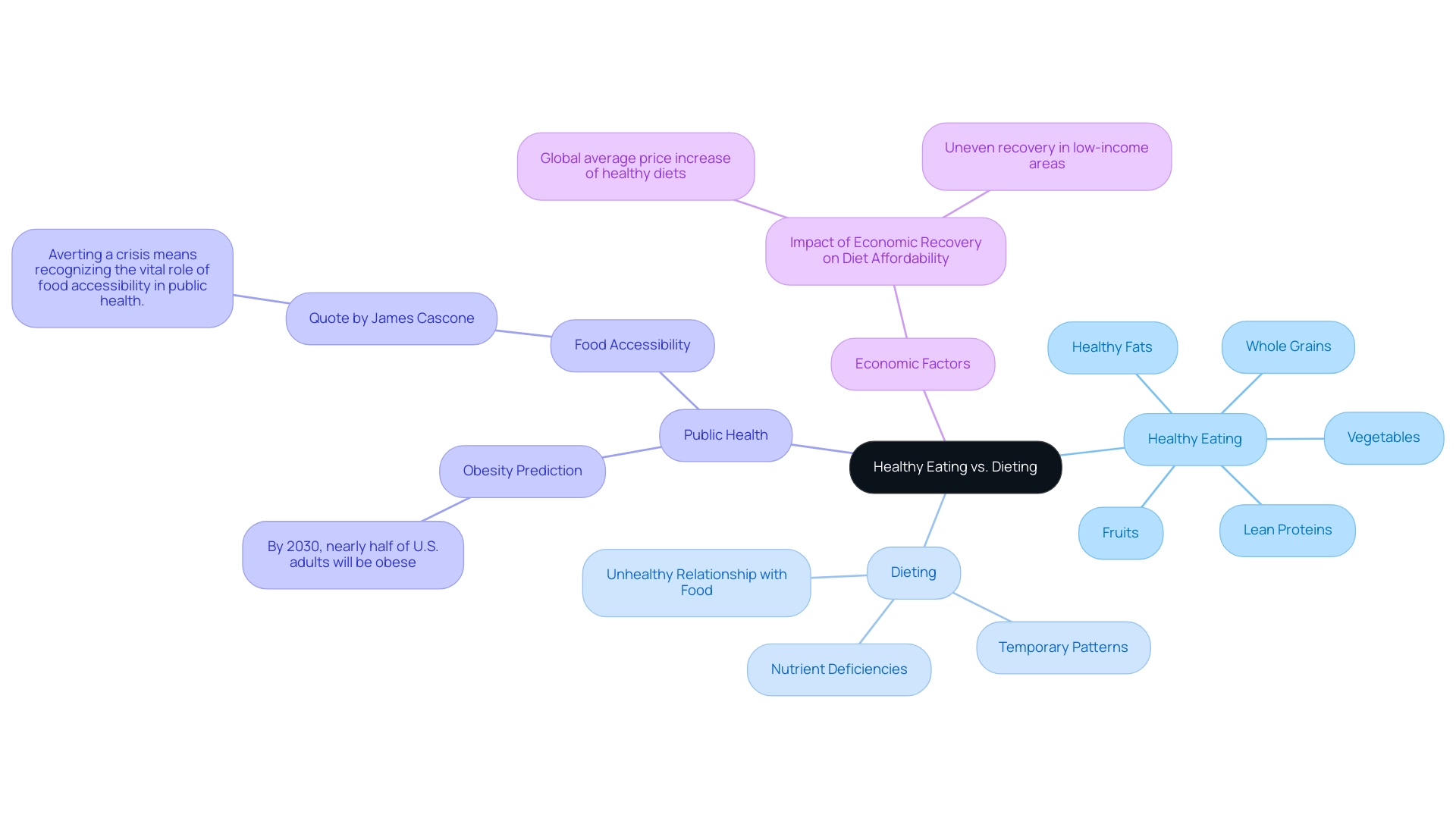
The Risks of Fad Diets and the Importance of Sustainable Changes
Fad eating plans often entice individuals with promises of rapid weight loss through extreme restrictions or imbalanced food choices. However, these eating plans frequently lead to significant health issues, such as metabolic slowdown, nutrient deficiencies, and disordered eating behaviors. Recent statistics indicate that a staggering number of participants in restrictive eating plans experience weight regain, contributing to frustration and disappointment.
According to a study published in the Annals of Internal Medicine, Weight Watchers results in 2.6% greater weight loss than simple diet control and education, and should be recommended by clinicians to their patients, underscoring the potential benefits of structured support over fad dieting. Instead of yielding to unsustainable practices, prioritizing sustainable dietary changes can help to describe the difference between a healthy diet and dieting to lose weight, paving the way for long-term wellness improvements. Incorporating more whole foods into daily meals, practicing mindful eating, and maintaining regular physical activity are essential steps to describe the difference between a healthy diet and dieting to lose weight while achieving wellness objectives.
Our wellness coaching app enhances this journey by offering personalized workouts, nutrition guidance, and daily programming tailored to individual needs. With features like direct messaging with coaches for personalized support and community engagement for motivation, individuals can cultivate a positive relationship with food, thereby enhancing their overall well-being and resilience against the pitfalls of fleeting diet trends. Many users have reported significant improvements in their well-being and lifestyle through our app, highlighting its effectiveness in fostering lasting changes.
By emphasizing convenience, our app centralizes all resources, making it easier for you to stay on track. By fostering these sustainable habits, you can thrive in your health journey and inspire your team to prioritize their well-being.
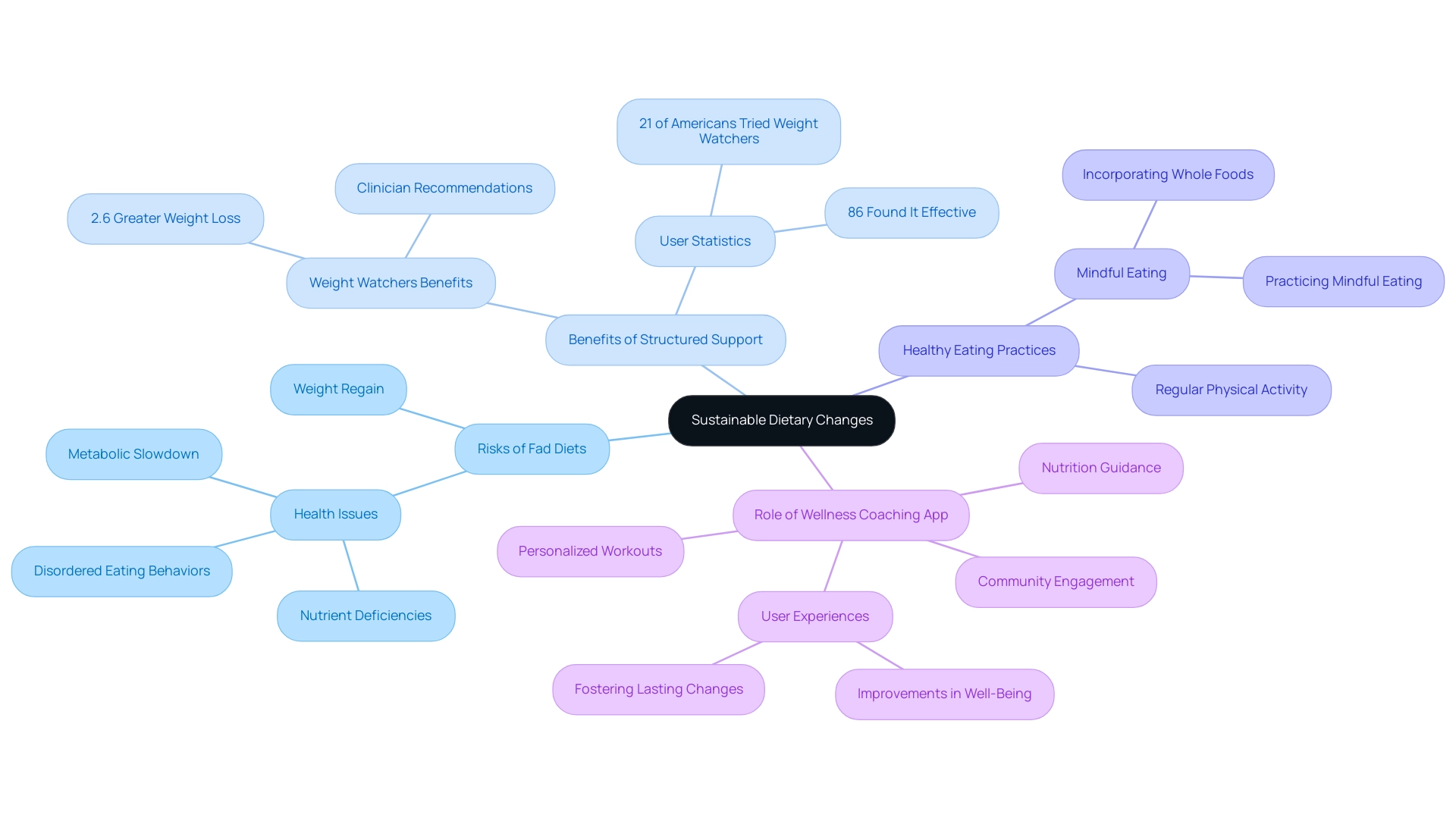
The Role of Mindful Eating in Healthy Living
Mindful consumption is a transformative approach that encourages individuals to be fully present during meals, fostering an awareness of hunger and satiety cues. By embracing this practice, individuals can savor the flavors and textures of their food, which not only reduces the tendency for emotional consumption but also nurtures a healthier relationship with food. Kayla Parsons, a PhD student at the University of Maine Cooperative Extension, emphasizes the importance of being aware of physical hunger and satiety cues to guide decisions on starting and stopping consumption.
This mindfulness leads to informed choices that prioritize nutritious options and allows for guilt-free enjoyment of meals. At Foresight Health Coaching, we believe in personalized support tailored to each individual’s journey, empowering them to make lasting lifestyle changes. Our comprehensive wellness programs include:
- One-on-one coaching sessions
- Nutritional guidance
- Workshops designed to cultivate healthy habits
The psychological benefits of mindful consumption are equally compelling; current research indicates that mindful practices can enhance psychological well-being and body satisfaction. A study on mindfulness interventions revealed that participants maintained an awareness subscale score of 0.02 from 6 to 12 months, while control participants had a score of -0.12. Furthermore, adopting a plant-based diet is advised for its wellness advantages and diminished environmental impact, further endorsing the mindful consumption philosophy.
However, it is important to note that more studies are needed to describe the difference between a healthy diet and dieting to lose weight in assessing the effectiveness of mindfulness practices for weight management. As we continue to explore the myriad benefits of mindful eating alongside our tailored wellness programs, it becomes clear that this approach is not just a dietary choice but a vital component of a holistic lifestyle that supports both physical well-being and emotional resilience. We invite HR Benefits Managers to connect with us to learn more about how our services can benefit your organization and support the health journeys of your staff.
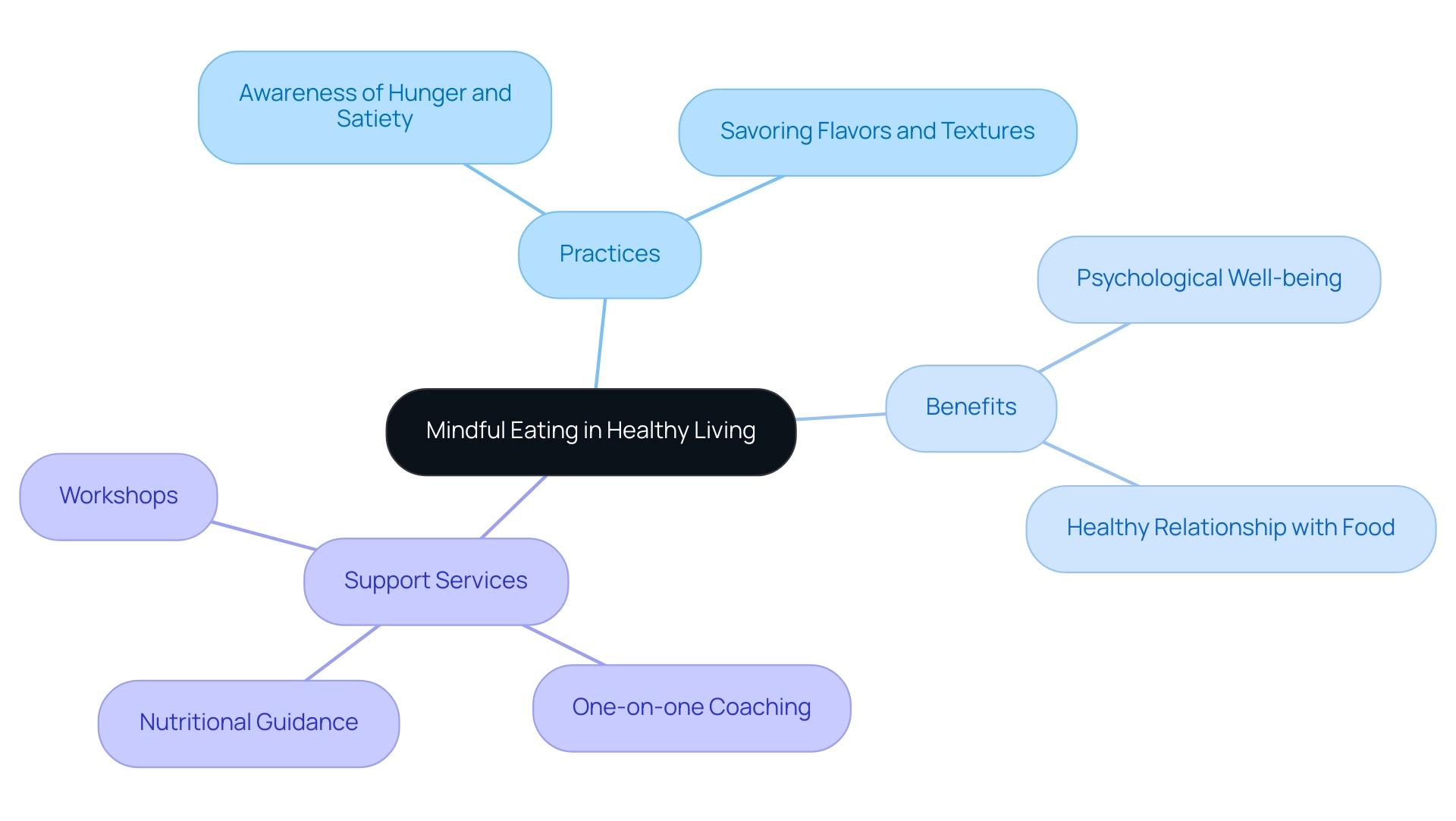
The Impact of Nutrition on Workplace Performance
Nutrition profoundly influences workplace performance, shaping energy levels, concentration, and overall productivity. Employees who maintain a balanced diet rich in essential nutrients not only take fewer sick days but also demonstrate heightened morale and greater job satisfaction. A striking 2024 statistic reveals that only 11% of workers in South Asia are thriving, underscoring the urgent need for effective nutritional initiatives.
By investing in customized corporate wellness programs—such as offering nutritious snacks, conducting nutrition workshops, and utilizing our transformative coaching app with a free 7-day trial—employers can significantly enhance workforce engagement and reduce healthcare expenses. This app supports personalized health recommendations that cater to individual worker needs, addressing the challenges they face. Moreover, as highlighted by GoRemotely, over 82% of remote staff managers express concerns about reduced productivity, indicating that fostering a healthy diet is essential for maintaining high performance levels.
Employee monitoring software can complement these initiatives by providing metrics on productivity and engagement, ensuring that the wellness programs effectively meet their goals. To counteract point solution fatigue, where staff feel overwhelmed by an excess of wellness offerings, organizations must streamline their programs to align with the needs of their workforce effectively. By prioritizing nutrition and leveraging technology, companies can enhance staff well-being, foster a cohesive team culture, and propel organizational success.
Take the first step towards a healthier, more engaged, and productive workforce by contacting Foresight Health Coaching today to explore corporate partnership opportunities.
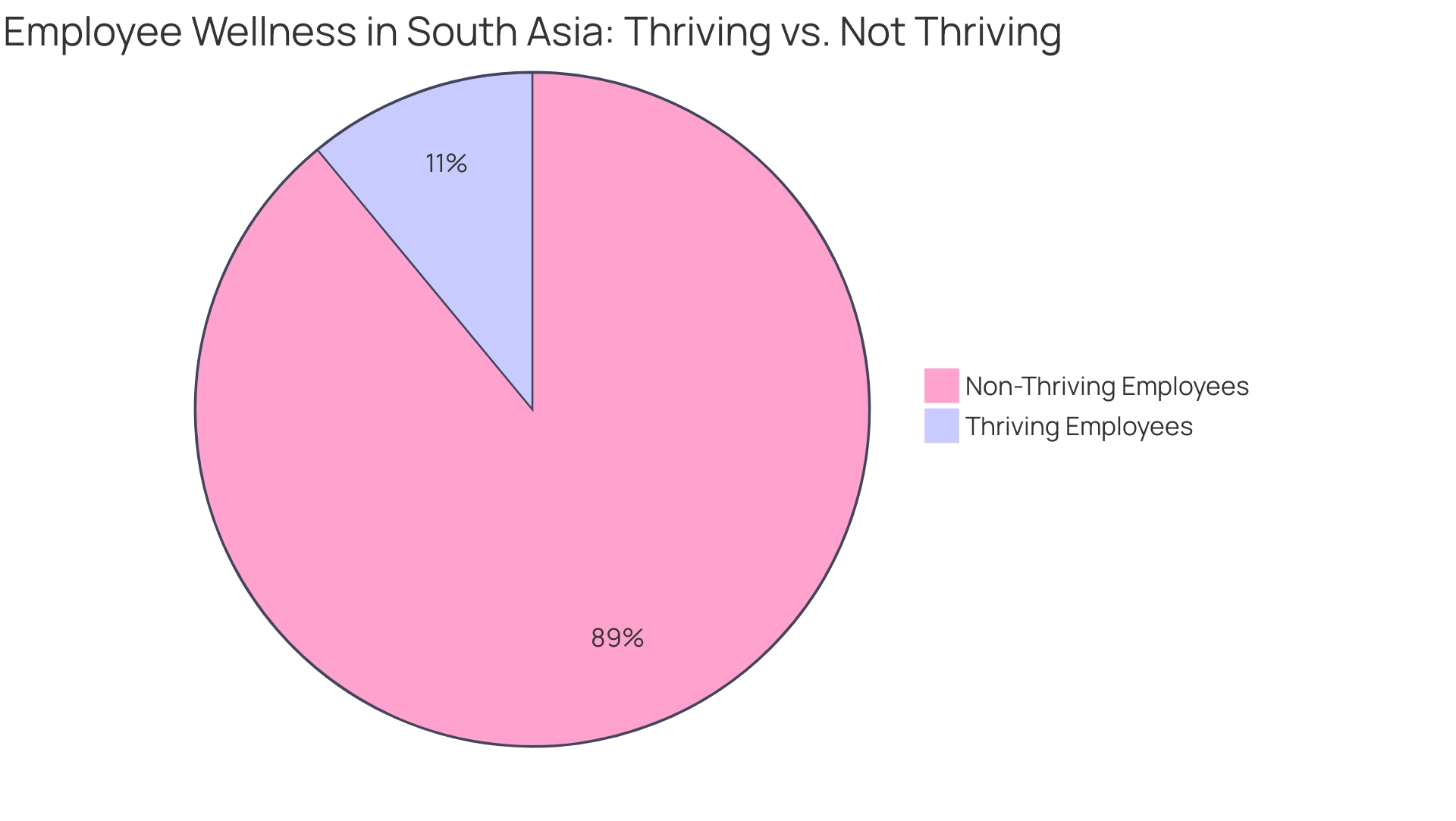
Creating a Culture of Health in the Workplace
Encouraging a culture of wellness within the workplace is vital for supporting staff well-being across all levels. Financial pressure greatly impacts mental well-being, sleep, and physical condition for numerous workers, making it essential for organizations to tackle these concerns. Introducing adaptable work hours can improve physical well-being by giving individuals the opportunity to participate in exercise and self-care.
Providing access to nutritious food options is another critical aspect, as it empowers employees to make healthier choices. Organizing team challenges that promote physical activity not only encourages fitness but also strengthens team dynamics. Moreover, prioritizing mental well-being awareness and offering resources for effective stress management can drastically improve overall morale.
As one survey respondent noted, 'In general, our workplace is open to constructive criticism and new ideas and supports workers with circumstances requiring special consideration.' This emphasizes the significance of fostering an atmosphere where well-being is prioritized. Additionally, a recent case study indicated a decline in workplace safety and mental health in 2024, emphasizing the need for improved mental health support.
By committing to these initiatives, organizations not only enhance employee well-being but also set the stage for a thriving workplace culture in 2024 and beyond.
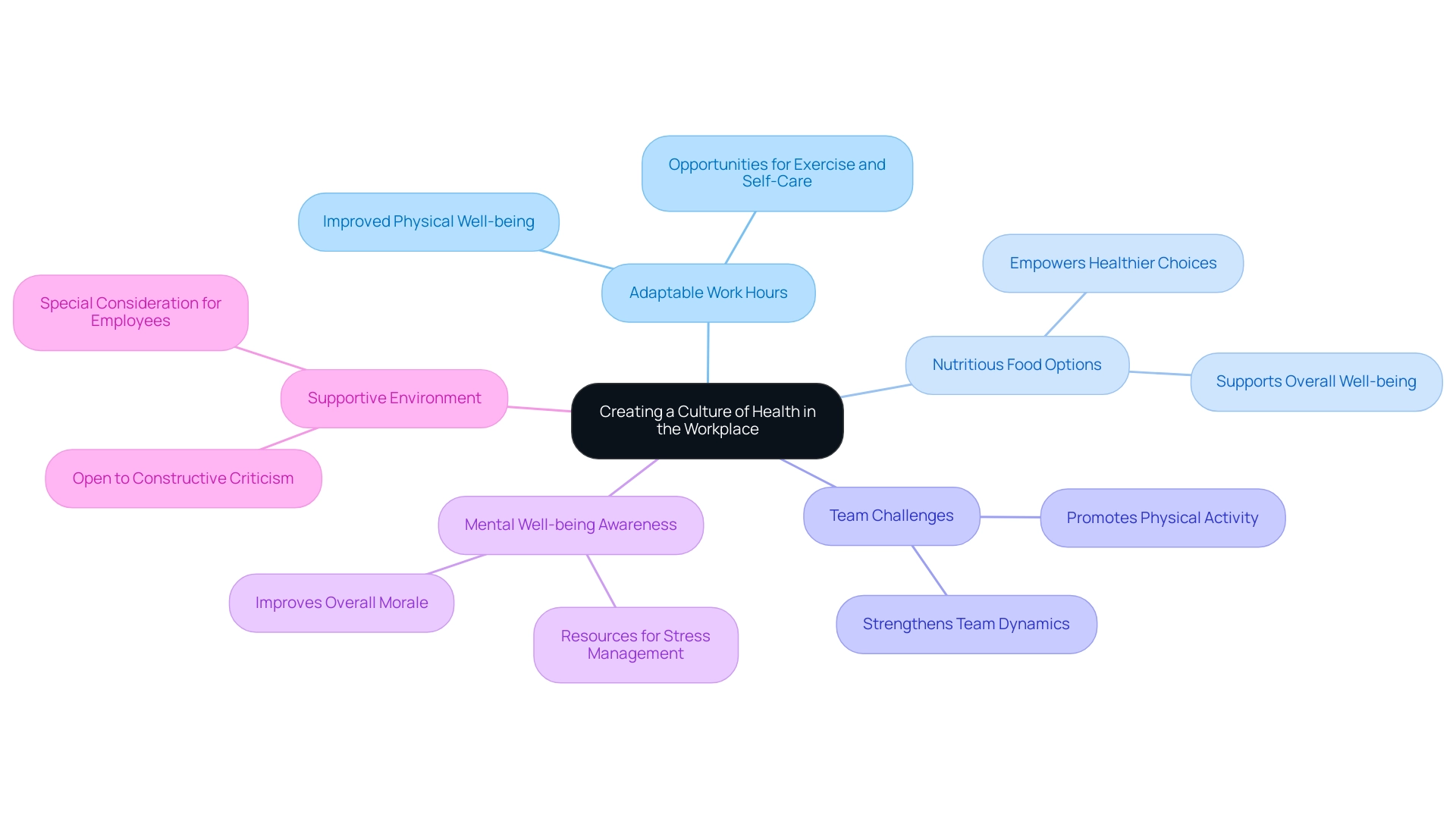
Conclusion
Embracing healthy eating over fleeting diet trends is not merely a personal choice; it is a vital strategy for organizations aiming to enhance employee well-being and productivity. The distinction between nourishing the body with whole, nutrient-rich foods and the temporary allure of fad diets is clear. Healthy eating fosters a sustainable lifestyle that supports physical health, mental resilience, and a positive relationship with food, while restrictive diets often lead to adverse health effects and a cycle of disappointment.
Mindful eating practices play a crucial role in this journey, encouraging individuals to connect with their food and listen to their bodies. By prioritizing nutrition and integrating mindful eating into daily routines, employees can improve their overall health and foster a supportive workplace culture that values wellness. The impact of nutrition on workplace performance cannot be overstated; a well-nourished workforce is more engaged, productive, and satisfied, ultimately benefiting the organization as a whole.
As organizations navigate the complexities of health in the workplace, the time to act is now. By investing in comprehensive wellness programs, providing access to nutritious foods, and fostering an environment that prioritizes mental health, HR Benefits Managers can champion a culture of health that empowers employees. This commitment not only addresses immediate health concerns but also lays the foundation for a thriving, resilient workforce ready to face the challenges of tomorrow. The journey towards a healthier workplace begins with informed choices and collective action—now is the moment to take that first step.




